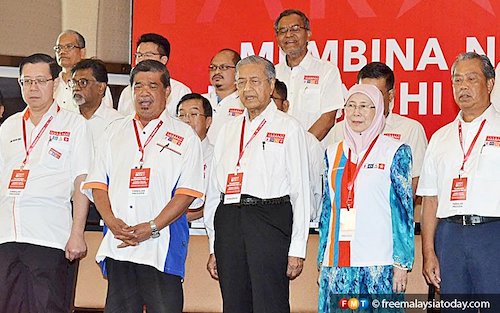The re-emergence of crony capitalism

Daniel Ong
Earlier this week it was reported that a Naza – Berjaya consortium has been chosen by the government as the new service provider, that will supply, maintain, and manage its fleet of official cars and police vehicles.
Although it has yet to be formally announced yet, a letter of intent was apparently issued by the government, which will see the consortium enjoying plush lines of cash for the next decade plus, starting with a pretty-much-guaranteed RM300 million a year from the fifth year onwards.
In spite of the fact that the finer details of how the consortium managed to snag such a lucrative (and absurdly long-winded) contract will never see the light of day, any Malaysians by now should know that crony capitalism is making a comeback here.
Something Tun Dr Mahathir is very much well known for.
Prior to the election of Pakatan Harapan as the government, the coalition – Tun Dr Mahathir especially – harped on how projects like the ECRL, TRX, and Bandar Malaysia are nothing but white elephants that will “undermine our sovereignty”, and the government of Tun Dr Mahathir will put a stop to it.
This of course, never materialised.
The ECRL has been continued – with a Chinese state contractor funding up to 85% (approximately RM30 billion). The residential project at TRX will be developed by an 80% – owned JV of China Communications and Construction Group (CCCG), with a gross redevelopment value of RM1.4 billion. Bandar Malaysia has also been continued, with a cost of RM140 billion for the development on government lands.
The amount of Chinese money in these two projects alone is surprising, given that Tun Dr Mahathir has consistently, until today, criticised the Forest City project in Johor, both for the amount of Chinese investments in the project, and the freehold structure of it.
Could it be because he could not get a slice of the pie? It is not as if the freehold structure is inherently unique to Forest City alone – freehold and 99-year leasehold property titles are available elsewhere in the country too, especially residential developed aimed at attracting foreign buyers.
The very same ones our Housing and Local Government Minister, Zuraida Kamaruddin, proposed to market to buyers from China and Hong Kong to solve an oversupply situation.
It is safe to say then, that the numerous u-turns on Chinese funded projects must have somehow benefited his circle of businessmen and tycoon friends.
But we do not even need to look so far for additional proof on the re-emergence of his brand of capitalism.
Since 2018, we have seen numerous projects sprouting up in his home state, Kedah, where his son Mukhriz is also serving as Chief Minister. Six months after coming into power, Mukhriz Mahathir announced that a green paper industry park will be developed with a Chinese coated duplex producer in Kulim, with investments amounting to RM1.2 billion funnelled in.
This of course, came right after Tun Dr Mahathir’s China visit, making it not too far-fetched to say that the Mahathir clan stands to benefit in some way from the numerous investments in the state. Kedah also houses the RM1-3 billion Kedah Integrated Fishery Terminal, the Kulim High-Tech Park, and a new cargo and international airport.
Despite being on the same coast as the KLIA and the Penang International Airport, Mukhriz has a simple rationale as to why Kulim needs a cargo airport: KLIA is just too far for Kulim High Tech Park investors to bring in their cargo.
The airport is set to straddle a cost beyond RM1 billion, over 600 ha of rubber land. Wouldn’t it make much more economic sends, if a fraction of the cost is channelled to develop Penang’s airport to handle cargo instead? Keep in mind that PIA is just 45 km away from the proposed Kulim site, surely someone somewhere is pushing the right buttons to make it happen nonetheless.
One can say that it is for the benefit of the people of Kedah, but how can this be true when a widely criticised plan for a Musang King plantation at Gunung Inas, which will entail environmental degradation and affect the water supply of nearby villages, has yet to be scrapped by the Kedah state government – even after repeated pressures by the villagers and environmental groups? In fact, the project has already taken shape, at the risk of displacement of native Kedahans from their villages.
For the Mahathirs and their friends, it is only good for the people when it is good for lining their pockets as well. It has only been a year and a half, and we are already seeing similar patterns emerging. As a Malaysian, I had hoped that we left this in the past. Alas, the opposite is true.
We need to ensure that the government of the day will be the government for the many, and not the few. Large scale projects that only benefit small groups, as we have seen in the past, at the expense of many should not happen as we venture into 2020.

